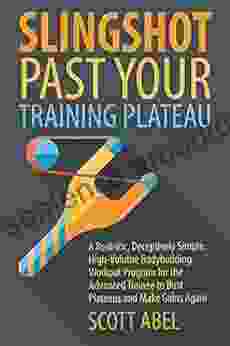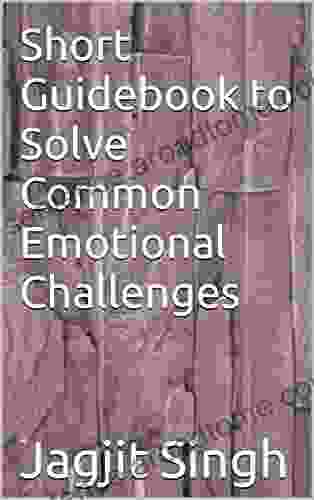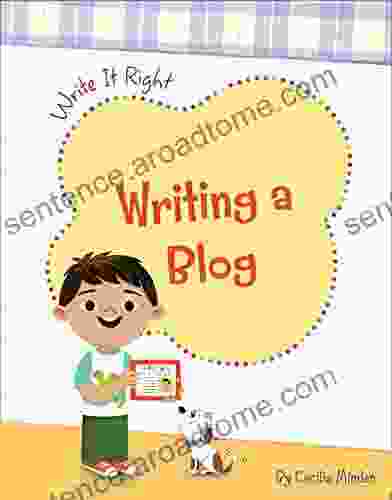Short Guidebook To Solve Common Emotional Challenges

4.5 out of 5
| Language | : | English |
| File size | : | 2509 KB |
| Text-to-Speech | : | Enabled |
| Screen Reader | : | Supported |
| Enhanced typesetting | : | Enabled |
| Word Wise | : | Enabled |
| Print length | : | 18 pages |
| Lending | : | Enabled |
In today's fast-paced and demanding world, it's common to experience a range of emotional challenges. These challenges can arise from various sources, including personal relationships, work stress, financial worries, or major life events. While it's normal to feel overwhelmed or discouraged at times, persistent emotional struggles can take a significant toll on our well-being.
This guidebook aims to provide you with a practical toolkit for addressing common emotional challenges and developing effective coping mechanisms. By understanding the underlying causes of your emotions and learning how to regulate them, you can empower yourself to live a more fulfilling and emotionally balanced life.
Chapter 1: Understanding Emotional Challenges
The first step to overcoming emotional challenges is to understand them. In this chapter, we'll explore the different types of emotions, how they manifest, and the potential triggers that can lead to emotional distress.
Types of Emotions
There are a wide range of emotions that we experience, each with its own unique characteristics and triggers. Some common emotions include:
- Happiness: A feeling of joy, contentment, and well-being.
- Sadness: A feeling of grief, disappointment, or sorrow.
- Anger: A feeling of frustration, irritation, or hostility.
- Fear: A feeling of apprehension, anxiety, or dread.
- Guilt: A feeling of remorse or responsibility over something we have done or failed to do.
Manifestations of Emotions
Emotions can manifest in a variety of ways, both physically and psychologically. Physical symptoms of emotional distress may include:
- Increased heart rate
- Muscle tension
- Sweating
- Shaking
- Nausea
Psychological symptoms of emotional distress may include:
- Difficulty concentrating
- Memory problems
- Negative thoughts
- Changes in appetite or sleep
- Social withdrawal
Triggers of Emotional Challenges
Emotional challenges can be triggered by a variety of factors, including:
- Personal relationships: Conflict, loss, or relationship problems can trigger strong emotions.
- Work stress: High-pressure work environments, deadlines, and job insecurity can lead to anxiety and stress.
- Financial worries: Money problems, debt, or financial instability can cause significant emotional distress.
- Major life events: Graduating, getting married, having children, or losing a loved one can trigger a range of emotions.
- Trauma: Experiencing a traumatic event, such as an accident, assault, or natural disaster, can have a lasting impact on our emotional well-being.
Chapter 2: Practical Strategies for Coping with Emotional Challenges
Once you understand the underlying causes of your emotional challenges, you can start to develop effective coping mechanisms. This chapter provides a range of practical strategies to help you manage your emotions and improve your overall well-being.
Cognitive Strategies
Cognitive strategies focus on changing the way you think about your emotions and your experiences. Some common cognitive strategies include:
- Cognitive restructuring: Identifying and challenging negative thoughts and replacing them with more positive and realistic thoughts.
- Mindfulness: Paying attention to your thoughts and feelings without judgment, allowing you to gain a better understanding of your emotions.
- Gratitude: Practicing gratitude can help you focus on the positive aspects of your life and reduce negative emotions.
Behavioral Strategies
Behavioral strategies focus on changing the way you respond to your emotions. Some common behavioral strategies include:
- Exercise: Regular exercise can release endorphins, which have mood-boosting effects.
- Sleep: Getting enough sleep is essential for emotional regulation and overall well-being.
- Social support: Talking to friends, family, or a therapist can help you process your emotions and gain support.
Emotional Regulation Techniques
Emotional regulation techniques are specific strategies that can help you manage your emotions in the moment. Some common emotional regulation techniques include:
- Deep breathing: Taking slow, deep breaths can help calm you down and reduce stress.
- Progressive muscle relaxation: Tensing and relaxing different muscle groups can help release tension and promote relaxation.
- Visualization: Picturing yourself in a calm and peaceful setting can help you relax and reduce anxiety.
Chapter 3: Overcoming Specific Emotional Challenges
In this chapter, we'll explore specific emotional challenges in more detail and provide tailored strategies for overcoming them.
Anxiety
Anxiety is a common emotional challenge that can manifest in a variety of ways, including panic attacks, obsessive thoughts, and phobias. Strategies for overcoming anxiety include:
- Cognitive restructuring: Challenging negative thoughts about the future and focusing on realistic and positive outcomes.
- Exposure therapy: Gradually exposing yourself to the things you fear can help you reduce avoidant behavior and build confidence.
- Mindfulness: Practicing mindfulness can help you stay in the present moment and reduce anxious thoughts.
Depression
Depression is a serious mental health condition that can cause persistent feelings of sadness, hopelessness, and worthlessness. Strategies for overcoming depression include:
- Medication: Antidepressants can help regulate neurotransmitters in the brain that are associated with mood.
- Therapy: Cognitive-behavior therapy (CBT) and interpersonal therapy (IPT) can help you identify and change negative thoughts and behaviors.
- Lifestyle changes: Exercise, sleep, and social support can all help improve mood and reduce symptoms of depression.
Anger
Anger is a natural emotion that can be triggered by a variety of situations. While it's important to express anger in a healthy way, it can be challenging to manage when it becomes excessive or destructive. Strategies for managing anger include:
- Cognitive restructuring: Identifying and challenging negative thoughts that lead to anger.
- Anger management techniques: Learning specific techniques for expressing anger in a healthy and constructive way.
- Communication skills: Developing effective communication skills can help you resolve conflicts and express your anger in a respectful way.
Overcoming emotional challenges is a journey, not a destination. It takes time, effort, and a willingness to learn and grow. This guidebook has provided you with a range of practical strategies to help you manage your emotions and live a more fulfilling and emotionally balanced life. Remember, you are not alone in your struggles, and there are many resources available to support you on your journey.
4.5 out of 5
| Language | : | English |
| File size | : | 2509 KB |
| Text-to-Speech | : | Enabled |
| Screen Reader | : | Supported |
| Enhanced typesetting | : | Enabled |
| Word Wise | : | Enabled |
| Print length | : | 18 pages |
| Lending | : | Enabled |
Do you want to contribute by writing guest posts on this blog?
Please contact us and send us a resume of previous articles that you have written.
 Book
Book Novel
Novel Page
Page Chapter
Chapter Text
Text Story
Story Genre
Genre Reader
Reader Library
Library Paperback
Paperback E-book
E-book Magazine
Magazine Newspaper
Newspaper Paragraph
Paragraph Sentence
Sentence Bookmark
Bookmark Shelf
Shelf Glossary
Glossary Bibliography
Bibliography Foreword
Foreword Preface
Preface Synopsis
Synopsis Annotation
Annotation Footnote
Footnote Manuscript
Manuscript Scroll
Scroll Codex
Codex Tome
Tome Bestseller
Bestseller Classics
Classics Library card
Library card Narrative
Narrative Biography
Biography Autobiography
Autobiography Memoir
Memoir Reference
Reference Encyclopedia
Encyclopedia Mr Peter
Mr Peter Silvia Congost Provensal
Silvia Congost Provensal James Curtis
James Curtis Susan Tuttle
Susan Tuttle Jean Feingold
Jean Feingold Jeanette Hurt
Jeanette Hurt Stuart Bangle
Stuart Bangle Jamil Baz
Jamil Baz Paul Oliver
Paul Oliver Timothy Flinn Smith
Timothy Flinn Smith Lisa Odham Stokes
Lisa Odham Stokes Jamie Goode
Jamie Goode Nobuo Niimura
Nobuo Niimura Joakim Verona
Joakim Verona Jamila T Davis
Jamila T Davis Vivienne Schiffer
Vivienne Schiffer Jane Wood
Jane Wood James Nelson
James Nelson Jd James
Jd James Philipp Fehre
Philipp Fehre
Light bulbAdvertise smarter! Our strategic ad space ensures maximum exposure. Reserve your spot today!
 Roger TurnerFollow ·3.9k
Roger TurnerFollow ·3.9k Oscar BellFollow ·17.2k
Oscar BellFollow ·17.2k Camden MitchellFollow ·17.4k
Camden MitchellFollow ·17.4k John GrishamFollow ·2.5k
John GrishamFollow ·2.5k Oscar WildeFollow ·12.4k
Oscar WildeFollow ·12.4k Jett PowellFollow ·16.8k
Jett PowellFollow ·16.8k August HayesFollow ·3.5k
August HayesFollow ·3.5k Terry PratchettFollow ·12.7k
Terry PratchettFollow ·12.7k

 Davion Powell
Davion PowellUnlock Your Muscular Potential: Discover the...
Are you tired of bodybuilding programs...

 Enrique Blair
Enrique BlairDominate the Pool: Conquer Performance with the DS...
As a swimmer, you...

 Christopher Woods
Christopher Woods"The Physics of Getting Out of Your Own Way": A Journey...
Break Free from...

 Milan Kundera
Milan KunderaWhat Really Sank The Titanic: New Forensic Discoveries
The sinking of the RMS...

 Ralph Waldo Emerson
Ralph Waldo EmersonUnveiling the Truth: Exposing the Hidden Dangers of Lyme...
In the realm of chronic illnesses, Lyme...
4.5 out of 5
| Language | : | English |
| File size | : | 2509 KB |
| Text-to-Speech | : | Enabled |
| Screen Reader | : | Supported |
| Enhanced typesetting | : | Enabled |
| Word Wise | : | Enabled |
| Print length | : | 18 pages |
| Lending | : | Enabled |














